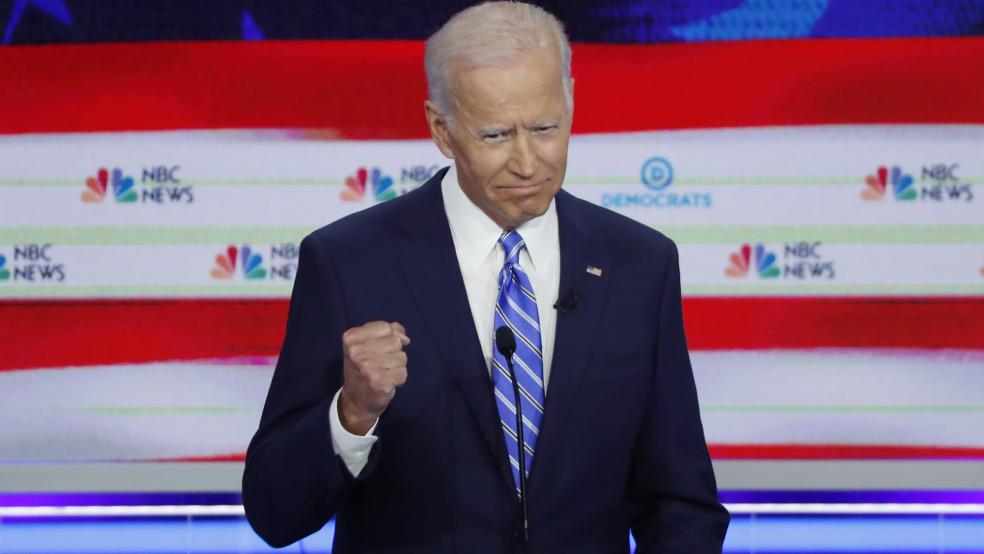Touting his ability to get things done by working with lawmakers from across the aisle, Joe Biden claimed during the Democratic debate Thursday that when he was vice president, he convinced a key Senate Republican to agree to a substantial tax increase. “We needed to be able to keep the government from shutting down and going bankrupt. I got Mitch McConnell to raise taxes $600 billion by raising the top rate,” Biden said, referring to the 2012 “fiscal cliff” negotiations, which revolved around the looming expiration of the Bush tax cuts and a temporary payroll tax cut, as well as an extension of unemployment benefits.
Biden’s claim was quickly challenged on the debate stage by Sen. Michael Bennet of Colorado, who said that the deal Biden made with McConnell did significant damage to the country’s fiscal condition:
“[T]he deal that he talked about with Mitch McConnell was a complete victory for the Tea Party. It extended the Bush tax cuts permanently. The Democratic Party had been running against that for 10 years. We’ve lost that economic argument because that deal extended almost all those Bush tax cuts permanently and put in place the mindless cuts that we still are dealing with today that are called the sequester. That was a great deal for Mitch McConnell.”
The back-and-forth on the issue highlights a loud and growing complaint from Biden’s left, namely that his long history of working with the opposition party involves more than a few instances of giving away the store in pursuit of bipartisanship. But Bennet’s criticism didn’t address the basic question of the accuracy of Biden’s claim: Did he get McConnell to “raise taxes $600 billion”?
Vox’s Matthew Yglesias dug into the details of the fiscal cliff negotiations, and concluded that Biden’s claim was off the mark:
“That would be quite the achievement, but it’s not what happened. What Biden got, instead, was an agreement for McConnell to support a partial extension of the Bush tax cuts except for tax cuts that would apply only to families that earned more than $450,000 a year.
"This did, it’s true, raise $600 billion in revenue relative to a baseline in which the tax cuts were fully extended. Except there was no universe in which that was going to happen. Republicans had just lost the election. The deal obviously lost a ton of revenue relative to a scenario in which the tax cuts simply expired. And it lost considerable revenue relative to scenario in which Democrats got their way and set the cut point at $250,000.”
So Biden did make an agreement with McConnell that produced an estimated $600 billion in revenue, but only compared to a demand from Republicans that was unlikely to become reality. Framing it as a tax increase neglects the larger context of the Bush tax cuts, Yglesias says, while claiming it as a victory for bipartisanship puts a shine on what, from the perspective of some other Democrats, was simply a bad deal.




